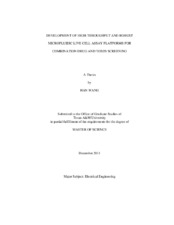| dc.description.abstract | Combination chemotherapies that introduce multi-agent treatments to target cancer cells are emerging as new paradigms to overcome chemotherapy resistance and side effects involved with conventional monotherapies. In environmental toxicology, characterizing effects of mixtures of toxins rather than simply analyzing the effect of single toxins are of significant interest. In order to determine such combination effects, it is necessary to systematically investigate interactions between different concentration-dependent components of a mixture. Conventional microtiter plate format based assays are efficient and cost-effective, however are not practical as the number of combinations increases drastically. Although robotic pipetting systems can overcome the labor-intensive and time-consuming limitations, they are too costly for general users. Microfluidic live cell screening platforms can allow precise control of cell culture microenvironments by applying accurate doses of biomolecular mixtures with specific mixing ratios generated through integrated on-chip microfluidic gradient generators.
This thesis first presents a live cell array platform with integrated microfluidic network-based gradient generator which enables generation and dosing of 64 unique combinations of two cancer drugs at different concentrations to an 8 by 8 cell culture chamber array. We have developed the system into a fully automated microfluidic live cell screening platform with uniform cell seeding capability and pair-wise gradient profile generation. This platform was utilized to investigate the gene expression regulation of colorectal cancer cells in response to combination cancer drug treatment. The resulting cell responses indicate that the two cancer drugs show additive effect when sequential drug treatment scheme is applied, demonstrating the utility of the microfluidic live cell assay platform.
However, large reagent consumption and difficulties of repeatedly generating the exact same concentrations and mixture profiles from batch to batch and device to device due to the fact that the generated gradient profiles or mixing ratios of chemicals have to rely on stable flow at optimized flow rate throughout the entire multi-day experiment limit the widespread use of this method. Moreover, producing three or more reagent mixtures require complicated microchannel structures and operating procedures when using traditional microfluidic network-based gradient generators. Therefore, an on-demand geometric metering-based mixture generator which facilitates robust, scalable, and accurate multi-reagent mixing in a high-throughput fashion has been developed and incorporated with a live cell array as a microfluidic screening platform for conducting combination drug or toxin assays. Integrated single cell trapping array allowed single cell resolution analysis of drugs and toxin effects. Reagent mixture generation and precise application of the mixtures to arrays of cell culture chambers repeatedly over time were successfully demonstrated, showing significantly improved repeatability and accuracy than those from conventional microfluidic network-based gradient generators. The influence of this improved repeatability and accuracy in generating concentration specified mixtures on obtaining more reliable and repeatable biological data sets were studied. | en |


